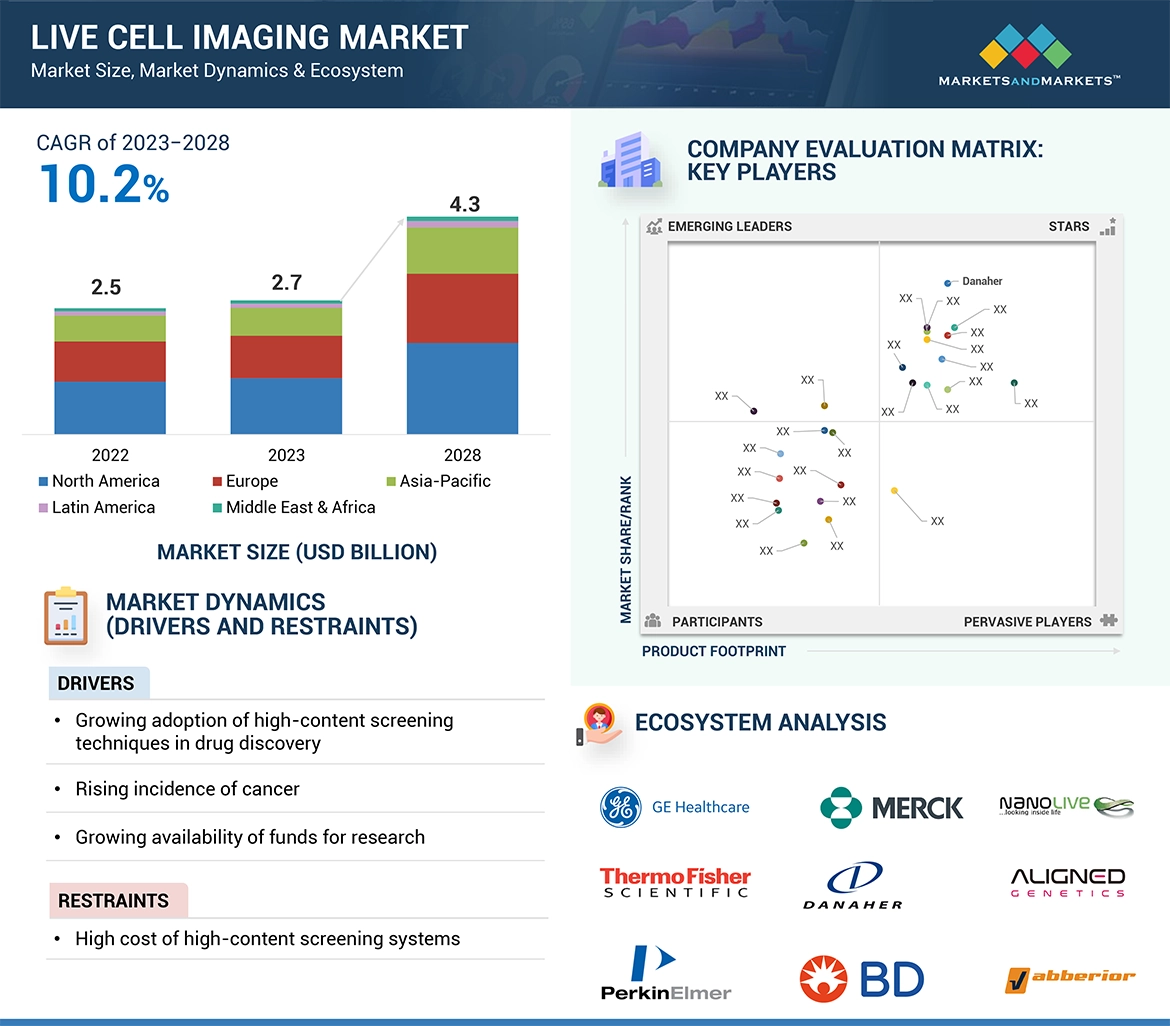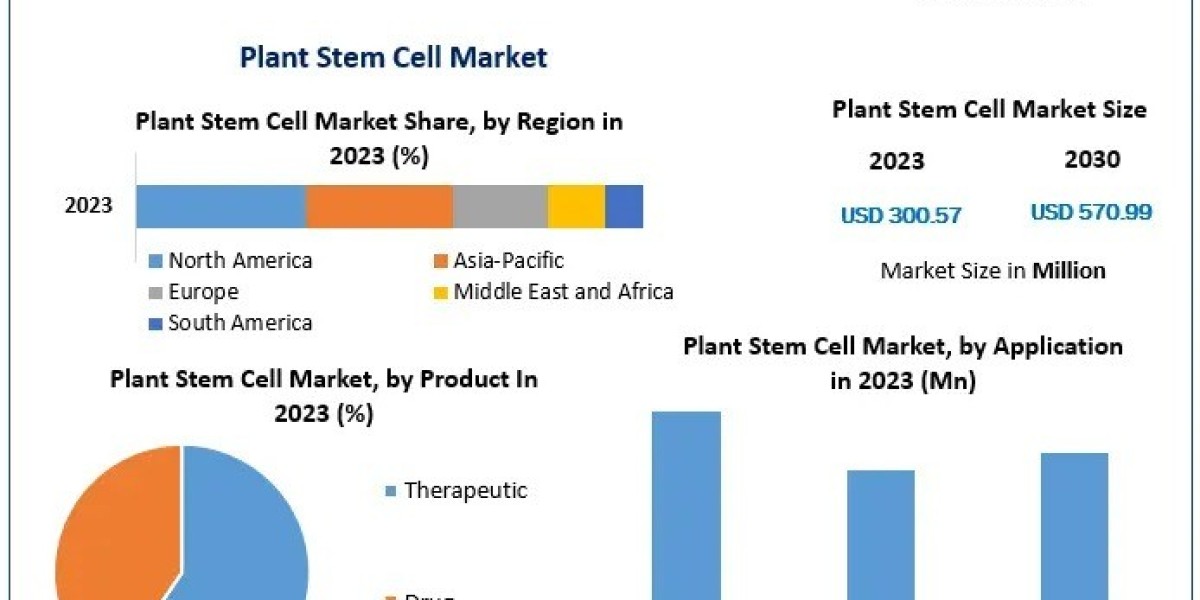The global live cell imaging market is anticipated to grow from USD 2.7 billion in 2023 to USD 4.3 billion by 2028, at a CAGR of 10.2%. Key factors driving this growth include rising adoption of high-content screening in drug discovery, increasing cancer incidence, and improved research funding. The high cost of screening systems, however, acts as a barrier to market growth.

Browse in-depth TOC on "Live Cell Imaging Market"
293 - Tables
50 - Figures
305 – Pages
The cell biology segment accounted for the largest share, by application in the live cell imaging market in 2022.
By application, the global live cell imaging market has been further categorized as cell biology, stem cells, developmental biology, and drug discovery. The cell biology segment held the largest share of the global live cell imaging market in 2022. This can be attributed to the increasing research activities in cell biology. Live cell imaging plays a crucial role in this research by allowing scientists to observe dynamic cellular events, such as cell division, migration, and signalling, in real-time. The increasing research activities in cell biology drive the demand for live cell imaging solutions.
The time-lapse microscopy segment accounted for the largest share of the technology segment in the live cell imaging market in 2022.
Based on technology, the global live cell imaging market has been segmented into time-lapse microscopy, fluorescence resonance energy transfer (FRET), fluorescence recovery after photobleaching (FRAP), high content screening (HCS), and other technologies. The time-lapse microscopy segment held the largest market share in 2022. The large share of this segment can be attributed to the real-time visualization of cellular dynamics, advancements in imaging technologies, increasing research focus on cellular dynamics, and drug discovery applications.
The North America region catered the largest share of the live cell imaging market in 2022.
The live cell imaging market in North America has experienced significant growth in recent years, showcasing a robust expansion trajectory, owing to the well-established research infrastructure, strong pharmaceutical and biotech industry, increasing government support for life science research, technological advancements in live cell imaging, and collaborative initiatives contribute to the growth of the live cell imaging market in the North America region. Additionally, North America faces a significant burden of chronic diseases, including cancer, cardiovascular diseases, and neurological disorders. The increasing prevalence of chronic diseases in the region drives the demand for live cell imaging techniques for both research and clinical applications.
Key Market Players:
Key players in the live cell imaging market include Danaher (US), ZEISS Group (Germany), Nikon Corporation (Japan), Olympus Corporation (Japan), PerkinElmer Inc. (US), Sartorius AG (Germany), Agilent Technologies, Inc. (US), Thermo Fisher Scientific, Inc. (US), Etaluma, Inc. (US), CytoSMART Technologies (Netherlands), NanoEnTek Inc. (South Korea), GE Healthcare (US), Bruker Corporation (US), Becton, Dickinson and Company (BD) (US), Merck KGaA (Germany), Bio-Rad Laboratories, Inc. (US), Blue-Ray Biotech Corp. (Taiwan), CYTENA GmbH (Germany), Nanolive SA (Switzerland), Abberior (Germany), Phase Holographic Imaging (PHI) AB (Sweden), Cytoskeleton, Inc. (US), Corning Incorporated (US), KEYENCE Corporation (Japan), and Aligned Genetics, Inc. (South Korea).
Recent Developments:
- In February 2023, Nikon Corporation launched the Nikon Spatial Array Confocal (NSPARC) detector for AX systems. This detector enables high-resolution imaging of live tissue with minimal phototoxicity.
- In January 2022, CytoSMART Technologies launched Omni Pro 12, adding to the Omni live cell imaging product portfolio.
Live Cell Imaging Market Advantages:
- Real-Time Visualization: Live cell imaging allows researchers to observe and analyze cellular processes in real time, providing dynamic and detailed insights into cellular behavior. This real-time visualization helps in understanding cellular dynamics, interactions, and responses to stimuli.
- Non-Invasive Imaging: Live cell imaging techniques are often non-invasive, allowing researchers to study cells without causing significant disruption or damage. This non-invasiveness preserves the natural state of cells and enables long-term monitoring of cellular processes without interfering with their functionality.
- High Spatial and Temporal Resolution: Live cell imaging techniques offer high spatial and temporal resolution, allowing researchers to capture fine details and rapid changes within cells. This level of resolution is crucial for studying dynamic cellular events, such as cell division, migration, signaling, and intracellular trafficking.
- Multi-Parameter Analysis: Live cell imaging enables the simultaneous analysis of multiple parameters within cells, such as protein localization, cellular morphology, and gene expression. This multi-parameter analysis provides a comprehensive understanding of cellular processes and their interplay.
- Quantitative and Qualitative Analysis: Live cell imaging facilitates both quantitative and qualitative analysis of cellular behavior. Researchers can quantitatively measure parameters such as fluorescence intensity, cell motility, and protein dynamics, providing quantitative data for statistical analysis. Additionally, qualitative observations and visualizations help in elucidating complex cellular phenomena.
- Advancements in Imaging Technologies: The live cell imaging market benefits from continuous advancements in imaging technologies, including improved microscope systems, sensitive detectors, and fluorophores. These advancements enhance imaging capabilities, enabling higher resolution, longer imaging durations, and better signal-to-noise ratios.
- Application in Diverse Research Areas: Live cell imaging finds applications in various research areas, including cell biology, developmental biology, neurobiology, pharmacology, and cancer research. It contributes to the understanding of disease mechanisms, drug discovery, and the development of personalized medicine.
- Integration with Other Technologies: Live cell imaging can be integrated with other technologies, such as image analysis software, high-content screening systems, and automated cell culture platforms. This integration enhances data analysis, throughput, and automation, increasing efficiency and productivity in research workflows.
These advantages position the live cell imaging market as a crucial tool in advancing our understanding of cellular biology, driving discoveries, and accelerating advancements in various fields of biomedical research.
About MarketsandMarkets™
MarketsandMarkets™ has been recognized as one of America's best management consulting firms by Forbes, as per their recent report.
MarketsandMarkets™ is a blue ocean alternative in growth consulting and program management, leveraging a man-machine offering to drive supernormal growth for progressive organizations in the B2B space. We have the widest lens on emerging technologies, making us proficient in co-creating supernormal growth for clients.
Earlier this year, we made a formal transformation into one of America's best management consulting firms as per a survey conducted by Forbes.
The B2B economy is witnessing the emergence of $25 trillion of new revenue streams that are substituting existing revenue streams in this decade alone. We work with clients on growth programs, helping them monetize this $25 trillion opportunity through our service lines - TAM Expansion, Go-to-Market (GTM) Strategy to Execution, Market Share Gain, Account Enablement, and Thought Leadership Marketing.
Built on the 'GIVE Growth' principle, we work with several Forbes Global 2000 B2B companies - helping them stay relevant in a disruptive ecosystem. Our insights and strategies are molded by our industry experts, cutting-edge AI-powered Market Intelligence Cloud, and years of research. The KnowledgeStore™ (our Market Intelligence Cloud) integrates our research, facilitates an analysis of interconnections through a set of applications, helping clients look at the entire ecosystem and understand the revenue shifts happening in their industry.
Contact:
Mr. Rohan Salgarkar
MarketsandMarkets Inc.
1615 South Congress Ave.
Suite 103, Delray Beach, FL 33445
USA : 1-888-600-6441
UK +44-800-368-9399
Email: [email protected]
Visit Our Website: https://www.marketsandmarkets.com/


